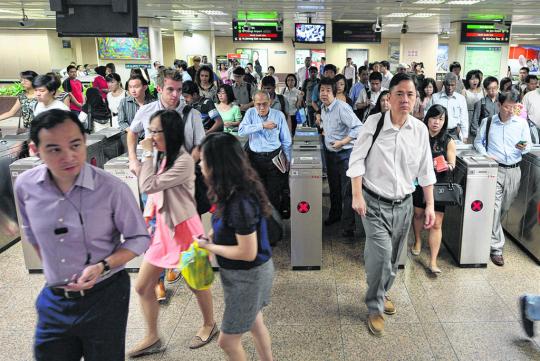Put fairness into fare reviews
Put fairness into fare reviews

 ECONOMISTS generally prefer to meet society's desire for equity through targeted, lump-sum transfers to the poor rather than across-the-board subsidies that depress prices. This is because broad-based subsidies not only distort prices, but their main beneficiaries are also usually the rich.
ECONOMISTS generally prefer to meet society's desire for equity through targeted, lump-sum transfers to the poor rather than across-the-board subsidies that depress prices. This is because broad-based subsidies not only distort prices, but their main beneficiaries are also usually the rich.
Where targeted transfers are provided, the dominant view in economics is that the state should finance these subsidies. This is because equity is a social concern; it is only fair that society - rather than profit-maximising firms - pays.
Seen from this perspective, the Public Transport Council's (PTC) announcement of fare increases, combined with targeted help financed by the Government for lower-income individuals and other segments of the commuting public, are both efficient and equitable.
Yet, announcements of fare increases in Singapore are usually met with acrimony by a sceptical public. Why is this?
One reason could be that commuters are unimpressed by the quality of our public transport system. Trains and buses are crowded during peak hours, and delays are common.
When confronted by these inconveniences, it is tempting for commuters to ask why there should be any fare increases at all, and to point to the healthy profits that Singapore's two public transport operators (PTOs) enjoy as evidence that the fare increases are unjustified.
Another reason is scepticism over the fare adjustment formula the PTC uses. This formula, which was revised late last year, is (rightly) responsive to the cost structure of the PTOs.
But given the duopolistic structure of the public transport industry here, it is fair to ask how regulators could possibly know if our PTOs' cost structure is efficient. This asymmetry of information between regulators and operators bedevils all markets with regulated monopolies.
In a market where there is genuine competition between many producers, consumers are far more likely to accept price hikes caused by across-the-board cost increases.
But in a duopolistic market such as Singapore's public transport industry, even justified price increases might seem like price-gouging to consumers. In short, the question of whether a fare increase is perceived as fair and justified is often linked to how the public transport industry structure is organised.
But the reality is that organisational form - whether it is government organisation or a commercial one - is a poor predictor of how efficient or productive an organisation will be. The experience of public transport privatisations elsewhere has been mixed at best. In some cases, such as the privatisation of the British Rail and the London Underground public-private partnership, privatisation has failed and required large capital injections by governments to bail out failing private operators.
This does not suggest that publicly run transport systems have been resounding successes. A government-run public transport system may remove the problem of information asymmetry between regulator and operators, but there is no guarantee it would result in higher efficiency and lower fares.
If a government-managed public transport system achieves lower fares via operating subsidies by the state, commuters would be paying for those subsidies indirectly through their taxes. Perhaps, the missing variable in the PTC's fare revision exercise is that it is not seen as being fair enough.
First, insights from behavioural economics suggest that in most people's minds, losses loom larger than gains. Various experiments suggest that we value losses twice as much as gains of the same size. This suggests that our adverse reaction to a fare increase is much stronger than our positive reaction to the offsetting subsidies.
Second, there is no penalty built into the fare review mechanism to penalise the PTOs for poor quality. The Fare Review Committee preferred to address quality lapses outside of the fare review mechanism. The committee's decision is not without merits. Fares should be set based on the cost of doing business on the assumption that the PTOs are performing at the standards set by the regulator.
If the PTOs are constantly penalised for poor quality through lower fares, they may end up in a financial position that makes it difficult for them to meet the prescribed quality standards in the first instance.
Nevertheless, this well-intentioned approach of decoupling penalties for poor quality from the computation of fares is insensitive to people's equity bias. It severs the link people want to see between price and quality. Commuters may thus interpret higher fares without a commensurate improvement in quality as simply a reward for mediocrity.
To satisfy the public's demands for fairness, policymakers can consider harmonising their fare review cycles with their reviews of the PTOs' performance.That way, the public will have less reason to believe that the PTOs are taking them for a ride - in more ways than one.
-- ST FILE PHOTO
by Donald Low and Alisha Gill for The Straits Times


2 Comments
Recommended Comments
Create an account or sign in to comment
You need to be a member in order to leave a comment
Create an account
Sign up for a new account in our community. It's easy!
Register a new accountSign in
Already have an account? Sign in here.
Sign In Now